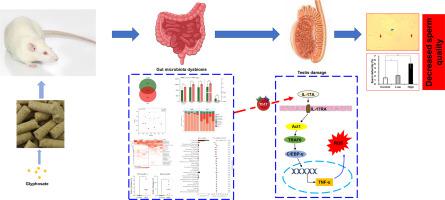Science of the Total Environment ( IF 9.8 ) Pub Date : 2021-09-16 , DOI: 10.1016/j.scitotenv.2021.150368 Jing-Bo Liu 1 , Kai Chen 2 , Zi-Fa Li 3 , Zhen-Yong Wang 1 , Lin Wang 1

|
Glyphosate (GLY), a ubiquitous environmental pollutant, can result in gut microbiota dysbiosis intimately involving various diseases. The latest research has shown an association between gut microbiota alteration and defective spermatogenesis. Here, we aimed to investigate whether GLY-induced gut microbiota dysbiosis contributed to male reproductive toxicity. Data showed that GLY-exposed rats exhibited male reproductive dysfunction, evidenced by impaired testis architectural structure, reduced sperm motility, together with increased sperm malformation ratio. 16S rDNA sequencing analysis indicated that GLY exposure altered the composition of gut commensal microbiota, of which the relative abundance of Bacteroidetes and Firmicutes phyla was significantly changed. Unexpectedly, the increased abundance of Prevotella_1 and Bacteroides genera was negatively correlated with sperm quality. Mechanistically, the pathological changes in GLY-exposed testis were accompanied by the increased interleukin (IL)-17A production, probably due to gut microbes-derived Th17 cell migration. Furthermore, activation of IL-17A signaling triggered testicular oxidative damage. Taken together, these findings uncover an underlying mechanistic scenario that gut microbiota dysbiosis-driven local IL-17A production is one reason responsible for male reproductive toxicity induced by GLY, which provides new insights into the male reproductive toxicity of GLY in mammals.
中文翻译:

草甘膦诱导的肠道微生物群失调促进大鼠雄性生殖毒性
草甘膦 (GLY) 是一种普遍存在的环境污染物,可导致肠道微生物群失调,与多种疾病密切相关。最新研究表明肠道微生物群的改变与精子发生缺陷之间存在关联。在这里,我们旨在研究 GLY 诱导的肠道微生物群失调是否会导致男性生殖毒性。数据显示,暴露于 GLY 的大鼠表现出雄性生殖功能障碍,表现为睾丸结构受损、精子活力降低以及精子畸形率增加。16S rDNA测序分析表明,GLY暴露改变了肠道共生菌群的组成,其中拟杆菌门和厚壁菌门的相对丰度发生了显着变化。出乎意料的是,Prevotella_1 的丰度增加和拟杆菌属呈负精子质量密切相关。从机制上讲,暴露于 GLY 的睾丸的病理变化伴随着白细胞介素 (IL)-17A 产生的增加,这可能是由于肠道微生物衍生的 Th17 细胞迁移。此外,IL-17A 信号的激活触发了睾丸氧化损伤。总之,这些发现揭示了一个潜在的机制情景,即肠道微生物群失调驱动的局部 IL-17A 产生是 GLY 诱导雄性生殖毒性的原因之一,这为 GLY 在哺乳动物中的雄性生殖毒性提供了新的见解。



























 京公网安备 11010802027423号
京公网安备 11010802027423号